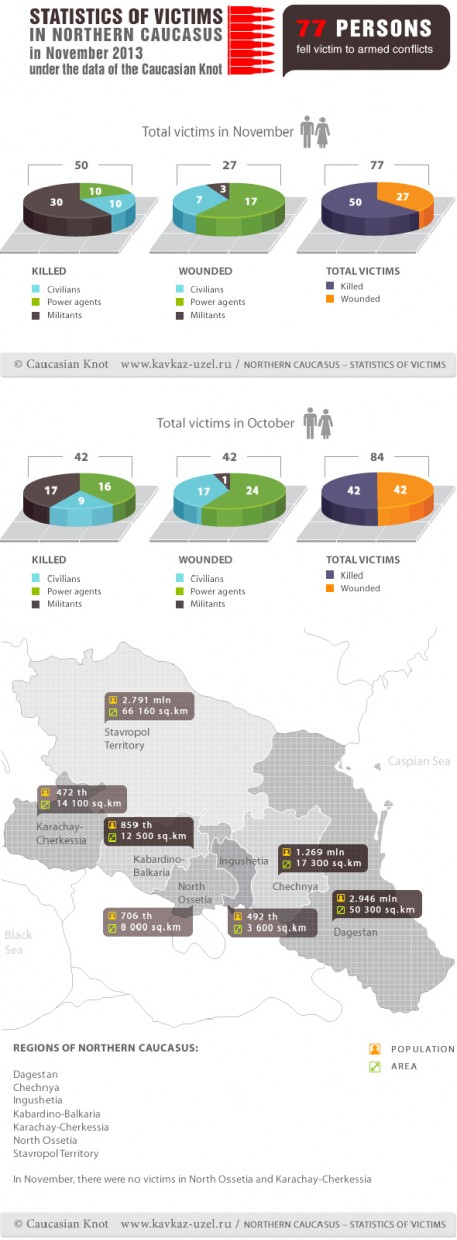Welcome to The Interpreter’s Sochi 2014 Winter Olympics Liveblog, day two. Click here to see yesterday’s Sochi Liveblog: The 48 Hour Dash to the Opening Ceremonies. Updates are below, so make sure to regularly refresh this screen.
2254 GMT: Andrei Soldatov has written an excellent summary of the state of the FSB’s electronic surveillance efforts in The Moscow Times. The recently expanded SORM program grants the FSB a vast range of powers to intercept and store (for up to three years,) copies of any electronic communication that passes through Russia’s territory. Soldatov points out that the Russian government seems happy to flaunt their new capabilities. He cites a Voice of Russia headline published shortly after an article he co-wrote on the SORM program for The Guardian:
“Don’t be scared of phone tapping during Sochi. It’s for your own safety.”
2118 GMT: While there is a debate about how vulnerable the Sochi Olympics are to terrorism, it is worth taking a look at nearby Dagestan to see how violent that conflict has become. The Russian media is not regularly reporting on the conflict, and Russian security forces are mostly operating in secret, so we can safely assume that the incidents that are reported are a tiny fraction.
Also read our analysis: Is Terrorism in Russia Really Getting Worse?
Below is a screen grab of our own newsfeed. What we find is that about once a week there is a fairly major incident reported by the press:
We also know that in recent months the amount of people killed in the insurgency averages 40-50 per month:
By looking at the geographical locations where terrorist attacks have occurred, we also see that some of the dots are uncomfortably close to where these Olympics are being held:
To call the North Caucasus a war zone is perhaps a stretch, but it is an active insurgency, perhaps resembling the conflict in Northern Ireland in the late 70s and early 80s. This is hardly a comforting thought for those who are trying to keep the Olympics safe, or for those who are attending, and this raises yet more questions about why Sochi was chosen to host these games, but as we mentioned before, the chance of a terrorist attack is still fairly low.
2050 GMT: The focus of the pre-Olympic coverage has been on the human rights abuses, insane levels of corruption, and the very-real terrorist threat that underlies the games at Sochi. The Interpreter’s Catherine Fitzpatrick has written an article called The Real Danger of the Sochi Olympics in which she argues that these things may not be the real threat. After all, the likelihood of a major disaster at the Olympics is still very small. There may not be a terrorist attack, the buildings are unlikely to collapse, and news agencies that are reporting on the events inside the stadiums are likely to ignore the wider context of what is going on outside of them. If the Olympics go off disaster free, people will quickly forget how dangerous the Olympic Games in Sochi really were. Furthermore, they will lose site of Russia’s social problems.
In other words, Putin will win big at Sochi:
Masses and masses of ordinary people who go to sports events — or watch them on TV – will come away impressed with the competitions and their breath-taking backgrounds, even if made up of manufactured snow.
The gay movement had a really great run with the hook of Sochi, getting many hipsters and progressives who normally don’t bother with Russia’s oppressive system to start speaking out. But even some gay people will no doubt wind up saying they never experienced any problems and even went to a gay club in Sochi – and then what? After it’s over , how will we keep getting attention to this issue?
The day after the Olympics, all the campaigners will be deprived of a hook for their grievances – still very legitimate – that they have grown used to expecting to “work” not only to showcase abuses, but end them.
That won’t happen. Putin, sadly, is too big, his rich cronies at home and abroad too many, and the weight of the masses affected by RT.com and sports entertainment media too great.
1906 GMT: Propaganda, the Russian media spreading a rumor, or a developing story?
Anton Korobkov-Zemlyanskiy, a Russian journalist and member of the Civic Chamber of the Russian Federation, has reposted a tweet claiming that an “Englishman had been stripped of his accreditation and visa” having been caught out for ripping hotel doors off and photographing them. Korobkov-Zemlyanskiy comments:
And now, how photos of “ripped off door handles in terrible Sochi hotels” are appearing on Western journalists’ blogs
Теперь о том, как появляются фото “оторванных ручек в ужасных сочинских гостиницах” в блогах иностранных журналистов pic.twitter.com/G24YvQ0vMs
— Коробков☃Землянский (@korobkov) February 6, 2014
The claim, posted by Maks Vasilyev, supposedly came from an Olympic volunteer. However in Vasiliyev’s following tweet, the story became more vague as the journalist in question is apparently “not English, but the point remains the same.” With no news so far on any journalists being expelled, it remains to be seen whether this is a true story or propaganda.
1845 GMT: It’s not just activists that are trying to save Sochi’s dogs. After authorities said that they would have to kill many stray dogs in the city as a public safety measure, Russian billionaire and oligarch Oleg Deripaska has spent $15,000 to create an animal shelter, and has pledged another $50,000 to keep it running for one year:
A charity financed by Deripaska has stepped in to try to save the stray dogs around the Sochi Olympic site that have been systematically exterminated in the past few months. “We were told, ‘Either you take all the dogs from the Olympic Village or we will shoot them,’ ” Olga Melnikova, who is leading the rescue plan for the charity, Volnoe Delo, told The New York Times.
1730 GMT: No Sochi 2014, who campaign against the holding of the Olympic Games on the site of the final massacre of Circassians in the Caucasus, have had their website hacked and taken down.
Well, someone’s upset! Our website is attacked. We are resolving the issue. If you need to contact us please do so through our Facebook page
— No Sochi 2014 (@NoSochi2014) February 6, 2014
1714 GMT: The Huffington Post reports that President Putin acknowledged the terrorist threat to the Olympic games:
Visiting the athletes’ village, he said: “We remember tragic situations which happened in the past during international competitions, including the one in the United States during the marathon. It’s all quite recent.”
1639 GMT: Russian officials have retaliated against media criticism of the poor preparation for the Sochi Games. The Wall Street Journal reports that:
Dmitry Kozak, the deputy prime minister responsible for the Olympic preparations, reflected the view held among many Russian officials that some Western visitors are deliberately trying to sabotage Sochi’s big debut out of bias against Russia. “We have surveillance video from the hotels that shows people turn on the shower, direct the nozzle at the wall and then leave the room for the whole day,” he said. An aide then pulled a reporter away before Mr. Kozak could be questioned further on surveillance in hotel rooms. “We’re doing a tour of the media center,” the aide said.
The admission that there are surveillance cameras in journalists’ rooms will add to fears of aggressive intrusion by the security services. Yesterday, an NBC reporter detected hacking of their laptop within minutes of booting up in a Sochi coffee shop.
One of the “very offended” officials to complain about coverage of the Olympic infrastructure was Vladimir Yakunin, president of Russian Railways. Yakunin’s company is estimated to have made $8 billion from the Sochi construction work, and has been ranked in Alexei Navalny’s Sochi corruption report as the champion of environmental destruction around the site.
President Putin’s spokesman, Dimitry Peskov, meanwhile suggested that some visitors were merely being fussy about the state of their accomodation:
“Everywhere someone doesn’t like the food, someone doesn’t like the hotel, someone thinks the mattress is too hard, etc. That is, such complaints accompany all Olympics”.
1442 GMT: After several snowboarders were injured, one of whom was evacuated on a stretcher, the famous snowboarding pioneer Shaun White will not participate in the slopestyle event because even after the course has been modified he believes that it is unsafe:
“With the practice runs I have taken, even after course modifications and watching fellow athletes get hurt, the potential risk of injury is a bit too much for me to gamble my other Olympics goals on,” White said…
Canada’s Sebastian Toutant said the course felt like “jumping out of a building,” and Finland’s Roope Tonteri told reporters that it was “pretty sketchy,” adding, “I just don’t want to get injured. It’s not a really fun course to ride.”
Not all snowboarders agree, however. NPR’s Morning Edition quoted one snowboarder who said that the snow was “sick,” which means good.
1434 GMT: Hundreds of stray dogs have already been poisoned to death in the streets of Sochi, as Russian officials scramble to deal with a problem that is the result of years of bad policy. As the New York Times reports, however, activists are quickly setting up dog shelters, and are asking Sochi’s tourists to donate money, or even to adopt a dog and return home with it:
1422 GMT: Yesterday much of the focus of the American media coverage was on the terrorist threat and the (frankly hilarious) problems with journalists hotel rooms and such. Today, expect the message to shift. As Washington Post’s Paul Farhi points out, news outlets, especially NBC which is broadcasting the games, have a lot of money invested in this Olympics, and if past Olympics are any indication, the negative news; or news about Russia’s social struggles, oppressive and anti-democratic laws, and rampant corruption; won’t play a major role in the way these events are covered.
As is, NBC has at least a billion reasons to emphasize the uplifting. It secured the American TV and digital rights to the Games by paying the International Olympic Committee $775 million; it will invest as much as $250 million to produce its coverage, which begins Thursday night. Over the next 18 days, the network and four sibling cable channels will devote more than 500 hours to Olympics programming; NBCOlympics.com will live-stream an additional 1,000 hours, including every event except Friday’s Opening Ceremonies (NBC will carry the opening and most events in primetime on a delayed basis, 11 hours after the fact). “It’s almost impossible to overstate how important the Olympics are to this company,” NBCUniversal chief executive Steve Burke told reporters last month.
The huge investment, and more than $800 million in sponsor commitments so far, has some observers primed to expect that the grimier aspects of the Games will be scrubbed from the picture. Much of NBC’s coverage of the Beijing Summer Olympics — the last hosted by an authoritarian government — was at pains to stress China’s social and economic progress, not its repressive recent past.
1405 GMT: Yesterday’s liveblog documented how unprepared Sochi was for the start of the Olympics. Hotels were unfinished, some hotel rooms had no floor, streets were half paved, grass was being painted green, electricity and water didn’t function, and there were warnings that the water was “dangerous.” Many of the pictures emerging from Sochi are good for a laugh, but they were the visual representation of corruption and incompetence that is behind much of Russia’s preparation for the Sochi Olympics.
To anyone in Sochi: I am now in possession of three light bulbs. Will trade for a door handle. This offer is real: pic.twitter.com/7AeesqDi8Y
— Dan Wetzel (@DanWetzel) February 4, 2014
There was also the revelation that the US intelligence agencies say they have specific information that a terrorist plot may unfold in Sochi. One warning was very specific, that terrorists may conceal explosives in tubes of toothpaste.
Today, Sochi’s first sporting events have started, despite the fact that the Olympics does not officially begin until tomorrow. We’ll get our first look at whether Sochi’s sporting facilities are as unready as its hotel rooms. We’ll also see whether there are protests, and if there are then we’ll also see how the Russian authorities respond to those protests.



